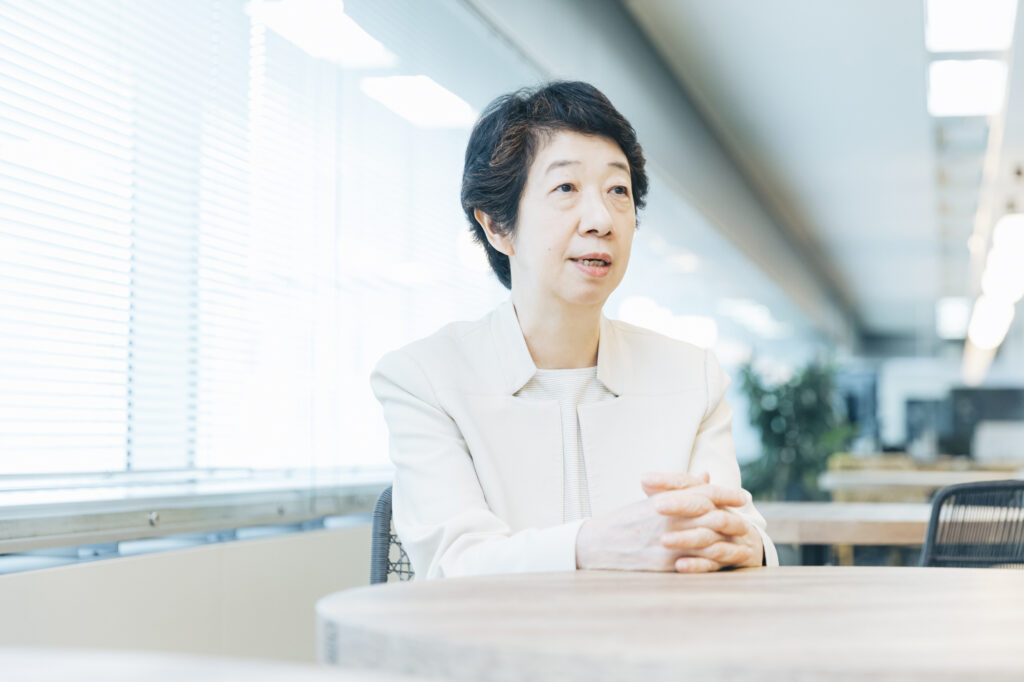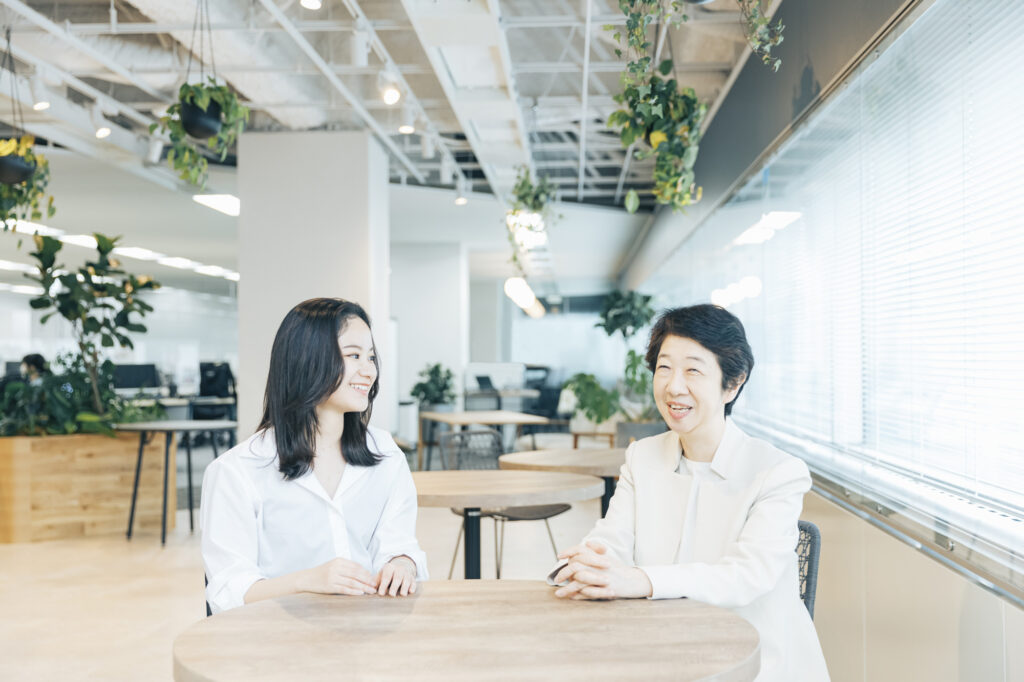“コテコテの日本企業”、NECはいかにして
インクルージョン&ダイバーシティに取り組んだのか

日本においてLGBTQ+ムーブメントを牽引してきたのは外資系企業だった。しかし、今や、グローバルなビジネス展開のためには伝統的日本企業もLGBTQ+のテーマに取り組むことが喫緊の課題となっている。NECでは5年前からインクルージョン&ダイバーシティを推進し、企業風土の変革に成功した。同社チーフ・ダイバーシティ・オフィサーの佐藤千佳さんにお話を聞いた。
NEC チーフ・ダイバーシティ・オフィサー
佐藤 千佳さん
聞き手・文/宇田川しい
写真/案納真里江
インクルージョン&ダイバーシティの
必要性すら感じていなかった
――NECさんといえば長い歴史がある、日本を代表する企業です。これまでLGBTQ+の問題というと外資系企業が先行して取り組んできました。日本の伝統的企業とも言えるNECが、なぜ今年からTRPに協賛するのでしょうか?
佐藤千佳さん まずNECという企業の風土がここ数年で大きく変わったということがあります。そこには時代にあった企業に変革していこうという強い経営意志がありました。特に採用面では大きく変化し、それまで新卒一括採用がほとんどでしたが、年々キャリア採用の割合を増やし、今では新卒採用とほぼ同数の600名ほどがキャリア採用です。
――佐藤さんご自身も外部から迎えられたのですね。
佐藤 2018年にカルチャー変革本部という部署の責任者に就任しました。インクルージョン&ダイバーシティを含む、広い意味の企業風土、カルチャーを変えてビジネスの再成長を促すという役職です。
――外から来た佐藤さんの目に、当時のNECはどのように映ったのでしょう。
佐藤 率直に申し上げて、驚きました。私はそれまで主に外資系企業で人事畑を歩んできましたが、LGBTQ+について15年ほど前には、就業規則に差別しないと明記したり、社内で教育啓発をするのがすでに当たり前でした。私が着任した当時のNECではほとんど何もされてなかったのです。それは、悪意があってとか、差別を放置しようとか、そういうことではなくて、問題の存在自体に全く気がついていませんでした。閉ざされた世界の中でインクルージョン&ダイバーシティの必要性を感じていなかったのだと思います。
――いかにも古い体質の日本企業といった感がありますね。
佐藤 新卒一括採用で、年数を経ていくと組織のピラミッドの上の方は日本人男性ばかり、そういう環境でした。そんな企業風土、組織のあり方ではこれからグローバルで戦えないということで、まずは多様な人材を取り入れるところから改革が始まりました。先ほどインクルージョン&ダイバーシティと言いましたが、最初は、ダイバーシティを意識し、キャリア採用やグローバル人材の採用を増やし、女性の活躍推進も一層に進めました。すると後追いでインクルージョンの必要性が非常に高まったのです。新卒一括採用に対応したインフラではひずみが生じてきました。キャリア採用者が通年五月雨式に入社してくる中で、社内の情報のあり方、議論の仕方など、合わないところがたくさん浮上してきました。
――従前からいる社員とキャリア採用組に軋轢があった?
佐藤 必ずしも不平不満みたいなネガティブな反応ではありませんでした。キャリア採用に対応した環境に変えていくことは、新卒採用で長く勤めている人たちにも歓迎されました。自分の考えを封印していたけれども、実は自分も困っていたことでした、変えたかったことでしたという声が多々ありました。
わずか5年で変革
TRP参加へ
――LGBTQ+については、どのような施策を行いましたか?
佐藤 まず福利厚生ですね。法律婚だけに適用されていたことを、事実婚、同性婚でも同等の権利を得られるようにしました。NEC本社だけでなく、グループ会社全ての就業規則を改訂しています。制度だけ作っても利用されなければ意味がないので、当事者が心理的安全のもとに制度を活用できるように、人事や役員に教育啓発も行いました。第一に、LGBTQ+についての理解を浸透させていくことを推進したのです。
――効果はどうでしょうか?
佐藤 明らかに変わってきたと感じます。今はTRPへの参加も当然と違和感なく受け入れられています。社内でも、少しずつですが当事者が声を上げはじめています。人事担当などに意見を述べてくれたり、質問を投げかけてくれたりということが起きています。2019年にはアライのコミュニティも発足し、LGBTQ+当事者の味方になるコミュニティがあることを表明しています。まだまだ改善できるところはあるものの、いわばコテコテの典型的日本企業がわずか5年の取り組みでここまできたかという感慨があります。
インクルージョン&ダイバーシティを 応用問題に展開する
――今からインクルージョン&ダイバーシティに取り組もうとしている日本企業にはたいへん参考になるお話ですね。先ほどキャリア採用が増え新卒一括採用時代の在り方では合わないところが出てきたとおしゃっていましたが、具体的にはどのような問題だったのか詳しく教えていただけますか。
佐藤 全てをきちんと言葉にはしない風土といいますか、阿吽の呼吸で成り立っているところがありました。ミーティングも議論の場というよりは、コンセンサスを得る場のようになっていたのです。元々、そういう環境の中で仕事をしていると違和感がないのかもしれませんが、外部から入社した立場からすると、ミーティングというのは異なる見方や意見を交わす場ではないのかと、不思議な状態だったのです。
また、4月に一括で社会人1年目として入ってくるというシステムなら、新人は少しずつ仕事に慣れていけばいいわけですが、キャリア採用で入ったら1日も早くトップスピードで仕事をしないといけないわけですよね。ですからキャリア採用組へ提供する情報のあり方を考える必要がありました。また仕事上必要な人間関係を構築するにも、なかなかスムーズにいかない。ビジネスライクにいかないんですね。こうしてキャリア採用を進めていくにつれて生じた違和感への対応に取り組んでいるわけですが、こうしたことは、この先、海外の仲間と協働していくときにも必要になってくるのだろうなと感じています。インクルージョン&ダイバーシティという切り口での取り組みは、応用問題として広く展開していくことができるということでしょう。
――なるほど、そもそも、キャリア採用者にインクルージョン&ダイバーシティという切り口で対応するということも応用問題であり、NECさんに特徴的かもしれませんね。
佐藤 キャリア採用で入ってきた新しい人材というのは、いわばマイノリティなんです。インクルージョン&ダイバーシティという切り口は有効でしょう。

女性を呪縛する アンコンシャスバイアス
――LGBTQ+やニューカマー以外にもインクルージョン&ダイバーシティという切り口で取り組んでいらっしゃることはありますか?
佐藤 当社ではインクルージョン&ダイバーシティの注力領域としてGender、Disability、New Comer、LGBTQ、Multi Cultureの5つの柱を掲げています。この中でも、今、特に注力すべきはGender、つまり女性の登用、活躍推進ではないかと思います。これは当社に限らないかもしれませんが、いわゆるアンコンシャスバイアスが大きな問題だと思います。新卒で入社した時には能力的な差がないのに、年数が経つにつれギャップが大きくなる。なぜかというと、多くの男性の上司が悪気のない配慮をするからなんです。“女性には、こんなに大変な仕事をさせたらかわいそう”、“女性に徹夜させるのはかわいそう”、“トラブルがあっても客先に謝りに行かせるのはかわいそう”、“子どもを持つ女性には海外出張は無理だろう”というような、こういった悪気のない配慮が何年も積み重なって、女性から経験する機会を奪い、男性と比べて実力においてもセルフコンフィデンスにおいても差が生じてくる。女性自身もアンコンシャスバイアスの呪縛に囚われていて、自分には難しい仕事は無理とか、まだ管理職にはなれないとか思い込んでしまう。そうしたさまざまな事情が重なって、管理職や意思決定層に女性が少ないという現状になってしまっているのだと思います。
――こういう状況に対してどのような取り組みをされているのですか。
佐藤 やはり、女性人材の積極的な採用と、育成、育成による昇格、そしてリテンションですね。こうした努力を長期にわたって続けていかないと、事態を改善することはできないでしょう。それからアンコンシャスバイアスという問題ですが、これは相手に伝えるということが必要です。相手は分かっていないわけですから、気づかせてあげないといけない。そのことを伝えないままに、相手の無理解を非難するというのはフェアではない気がします。アンコンシャスバイアスを受けた当事者が相手に伝える努力も必要ですが、本人が伝えにくい場合に、横にいる第三者が伝えられるように、この問題について啓発していくことも重要ですね。
変革をドライブする人から波及して 人の心を動かすものが必ず生まれる
――今年、初めてTRPパレードに参加しますね。
佐藤 はい。CHROもパレードを歩くと言っています。トップ層からこの意識改革に取り組んでいこうという、NECとしての意思表明です。当社のような、古いタイプの日本企業と思われている会社が、TRPに参加するということはインパクトがあるでしょうし、そのことが他の日本企業にも良い影響を与えることになればいいですね。この5年の間に、NECで起きたことを参考にしてもらえるかもしれません。変革をドライブする人がいれば、そこから波及していって、人の心を動かすものが必ず生まれます。そして、いつの間にか同志が大勢、増えているはずです。
――同志とおっしゃいましたが、一緒に取り組んでいく仲間は大切ですね。
佐藤 そうですね、人の絆が物事を動かします。キャリア採用を増やしたというお話をしましたが、外から来た人間だけで変えられるわけではないんです。もちろん、誰も外から来ない、同質性の高い集団にも変革は出来ない。両者が一緒になっていく時に変革が起きます。新しい人たちが入ってくることによって、長く勤める人たちも刺激を受けて、新たに輝きはじめるんです。今年のTRPのテーマは「変わるまで、続ける」ですが、続けることの重要性を、今、とても実感しています。これまで5年間、取り組んできましたが、ここで気を抜いたらすぐに昔に戻ってしまうでしょう。変化を常態化させることこそ、重要なのだと思います。

How did NEC, a company with a traditional Japanese corporate culture, approach the issue of inclusion and diversity?

While foreign-affiliated companies have led the LGBTQ+ movement in Japan, NEC has spent the past five years proactively promoting inclusion and diversity to transform its corporate culture. We sat down with Chika Sato, Chief Diversity Officer at NEC, to learn more about the company’s efforts.
Chika Sato
Chief Diversity Officer, NEC
Interview / Text by Shii Udagawa
Photos by Marie Anno
A lack of recognition of the need for inclusion and diversity
――Foreign-affiliated companies were among the first to tackle LGBTQ+ issues in Japan. What was it that spurred NEC, a traditional Japanese company with a long history, to sponsor Tokyo Rainbow Pride (TRP) this year?
Chika Sato: I should begin by noting that NEC’s corporate culture has undergone significant changes in recent years. Our management team is strongly committed to transforming NEC into a company that is aligned with the current era. One example of this is the dramatic changes we have made to our recruitment approach. In the past, the majority of our employees were hired as new graduates. However, we have increased the percentage of mid-career hires over time, and around 600 employees—nearly equivalent to the number of new graduates—are now mid-career hires.
――Ms. Sato, weren’t you a mid-career hire?
Sato: In 2018, I joined NEC and took on the position of leading the Culture Transformation Division, which focuses on broad initiatives to transform NEC’s corporate climate and culture, including those aimed at promoting inclusion and diversity, as part of our efforts to achieve business growth.
――As an outsider coming into NEC, what were your initial impressions of the company?
Sato: To be honest, I was a bit surprised. Having primarily worked in HR at foreign-affiliated companies in the past, I knew that it was already common practice 15 years ago to explicitly state in employment regulations that LGBTQ+ employees shall not be discriminated against and to internally educate and raise awareness within the company. However, when I first joined NEC, I found that almost nothing was being done in this regard. This was neither due to ill intent nor was it meant to overlook discrimination—it was simply a lack of awareness of the issue itself. The company did not recognize the need for inclusion and diversity in its own closed-off world.
――That sounds like the antiquated corporate culture of a traditional Japanese company.
Sato: NEC was a company that hired new graduates all at once, thereby resulting in the top of the organizational hierarchy being dominated by Japanese men. We began to realize, however, that such a homogeneous and closed corporate culture would not be sustainable in the global market. Therefore, we initiated our reforms by diversifying our employees. Initially, we focused on increasing the number of mid-career hires and global talent and promoting the active participation of women. However, as time went on, we realized that inclusion and diversity were crucial to sustaining our reform efforts. We also found ourselves facing challenges in terms of the infrastructure supporting the simultaneous hiring of new graduates. With mid-career hires joining the company intermittently throughout the year, we encountered inconsistencies in the way information and discussions were conducted within the organization.
――Was there any friction between existing employees and external hires?
Sato: The changes we made to accommodate mid-career hires were not met with negative reactions or complaints. In fact, they were welcomed by long-time employees originally hired as new graduates. Many expressed that it was something they had been thinking about but hadn’t voiced, and that they had been experiencing difficulties that needed to be addressed.
From zero to TRP: NEC’s remarkable five-year journey to Inclusion and Diversity
――Can you tell us what specific measures NEC has taken to promote inclusion and diversity for LGBTQ+ employees and stakeholders?
Sato: First, we have implemented an employee benefit program and revised the employment regulations not only at NEC headquarters but also at all NEC Group companies. Benefits that were once only applied to legal marriages are now equally applicable to both de facto marriages and same-sex marriages. Moreover, we have provided education and training to our HR members and Company executives to ensure the system can be utilized in a psychologically safe manner by those who need it. Additionally, we have been promoting the spread of understanding and awareness about LGBTQ+ issues.
――What is your assessment of the impact of the LGBTQ+ measures implemented thus far?
Sato: It’s clear that things have changed. Participation in Tokyo Rainbow Pride is now openly accepted. Even within the company, those involved in the program are gradually becoming more vocal. They are expressing their opinions to HR and asking questions. In 2019, we launched a community of allies to show support for LGBTQ+ employees. While there is always room for improvement, it’s impressive to see how far a traditional Japanese company like NEC has come in just five years.
Going beyond the basics of Inclusion & Diversity
――This is a valuable story for Japanese companies currently striving to promote inclusion and diversity. As you mentioned earlier, the shift toward hiring more mid-career candidates has highlighted the limitations of traditional practices that were developed for large-scale hiring of new graduates. Could you please elaborate on what the specific issues were?
Sato: There was a culture of leaving things unsaid and unexpressed. Meetings were more about arriving at a consensus rather than facilitating open discussion. That may have seemed normal for those who were accustomed to working in such an environment. However, from the perspective of a mid-career hire, it was puzzling to witness meetings that were not used to exchange diverse views and opinions.
Additionally, in the traditional hiring system where new employees all start together in April, there is always a bit of a learning curve as they adjust to their roles. However, mid-career hires were expected to quickly adapt and perform at a high level. This required us to develop ways to provide information and support to mid-career hires. It also proved challenging to build successful working relationships since the process was not as formal as that of the traditional hiring system. As we continue addressing these challenges, I believe it will also be crucial for us to consider these issues when collaborating with overseas colleagues in the future. This is why I view the approach of inclusion and diversity as an applied issue with wide-ranging implications.
――I see. Addressing mid-career hires from the standpoint of inclusion and diversity is actually a practical matter, and perhaps one that is specific to NEC.
Sato: The mid-career hires who come in as new employee can be considered a minority group within the company. Utilizing an approach from the perspective of inclusion and diversity can therefore be effective in addressing their unique needs and challenges.

The negative effects of unconscious bias on women in the workplace
――In addition to LGBTQ+ and newcomers, is there anything else you are working on from the perspective of inclusion and diversity?
Sato: NEC is currently focusing on five pillars of inclusion and diversity: Gender, Disability, Newcomers, LGBTQ+, and Multiculturalism. Among these, I believe we should be placing particular attention on gender, specifically the promotion and advancement of women. This is not unique to our company, as unconscious bias is a pervasive issue throughout society. When new graduates join a company, there is no discernible difference in their abilities. However, as the years go by, a gap emerges. This is because many male bosses may not give fair consideration to women. They may say things like, “I feel sorry for women if they have to do such hard work,” “I feel sorry for women if they have to stay up all night to deal with urgent matters,” “I feel sorry for women if they have to go apologize to customers when they have problems,” or “It would be impossible for a woman with a child to go on an overseas business trip.” Comments like these deprive women of opportunities to gain experience and create a gap in terms of competence and self-confidence between men and women. Women themselves may also get caught in the trap of unconscious bias, thinking that they are incapable of handling difficult work or not yet ready for management positions. These various factors have contributed to the current situation where few women in Japan and at NEC hold management and decision-making positions.
――What are you doing to address this situation?
Sato: To improve the situation, we need to actively hire, develop, promote, and retain female talent. These efforts must be sustained over a long period of time. Another issue is unconscious bias, which requires communication with those who hold such biases. We cannot simply accuse them of not understanding without attempting to communicate with them. While it is necessary for those who experience unconscious bias to make an effort to communicate with others, it is also important to educate people about this issue so that a third party can step in and facilitate communication when needed.
The ripple effect of drivers of change that touches people’s hearts and provides inspiration
――This year, you will be participating in the TRP parade for the first time, won’t you?
Sato: Yes, and our Chief Human Resources Officer (CHRO) has also committed to participating in the parade. This is a clear indication of NEC’s commitment to driving awareness reform from the highest level. As a company often considered old-fashioned, our participation in the TRP parade will have an impact, and I hope that it will also have a positive influence on other companies in Japan. Perhaps they can learn from NEC’s experiences over the past five years and use them as a reference. When there are individuals who take the lead in driving change, it creates a ripple effect that touches people’s hearts and inspires them. Soon, there will be many like-minded individuals, making progress inevitable.
――You mentioned individuals, but it’s important to have peers working alongside you as well, isn’t it?
Sato: I agree that it is the connections between people that drive progress. While we have increased the number of mid-career hires at NEC, we can’t rely solely on external hires to effect change. Likewise, a completely homogenous group cannot bring about change either. It is when individuals from diverse backgrounds come together that change happens. The introduction of new perspectives and ideas sparks creativity and reenergizes long-time employees. This year’s TRP theme, “Press on till Japan changes,” highlights the importance of persistence. We have been working on this for five years, but we must continue to push forward. If we become complacent, we risk reverting to our old ways. Therefore, I believe it is imperative for us to make change the new norm.























-234x60.png)












































-234x60.jpg)




-234x60.png)



























-234x60.png)








-234x60.png)









-120x60.png)





-120x60.png)






